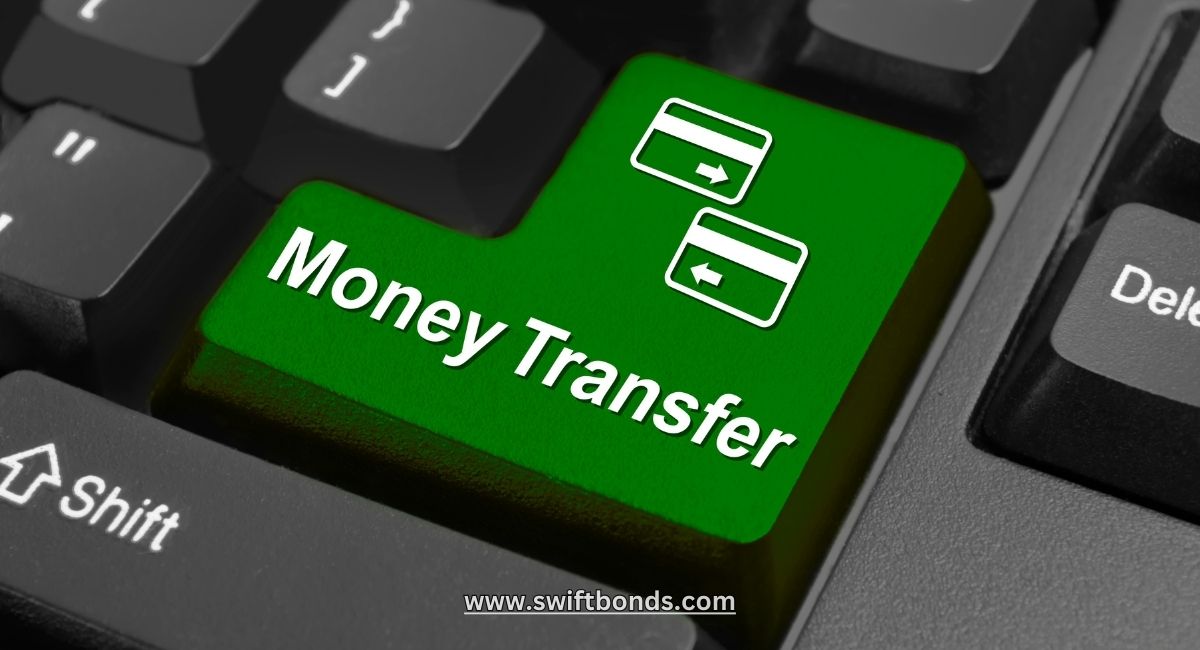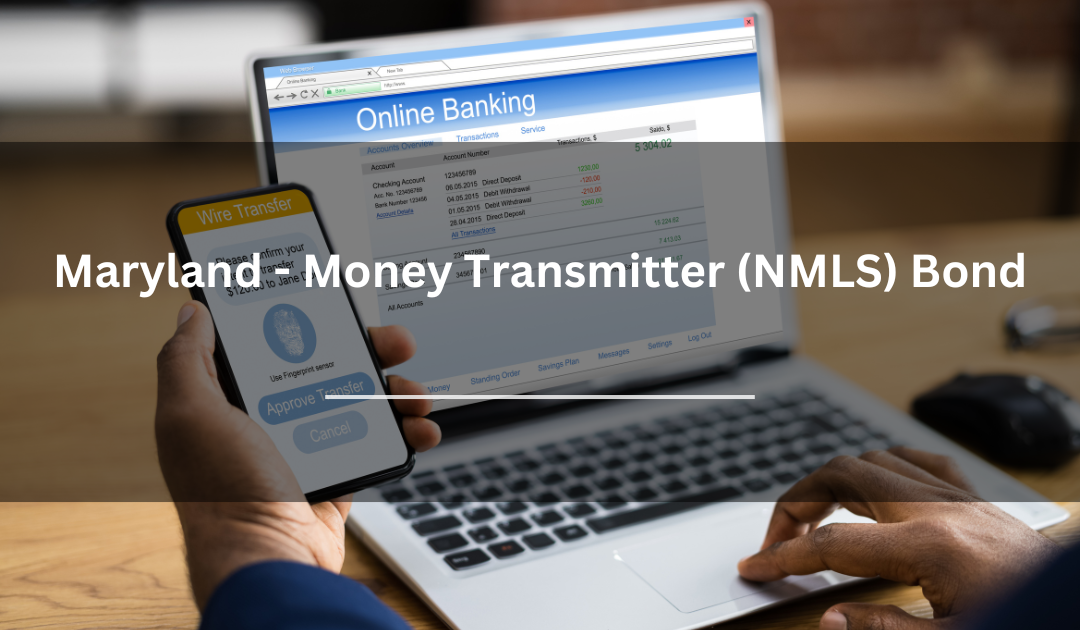Get an Instant Quote on Money Transmitter (NMLS) Bond
Introduction
From our perspective, financial service providers play a significant role in Maryland’s economy by facilitating secure money transfers for consumers. Businesses operating as money transmitters must comply with strict state and federal regulations to protect public trust and financial integrity. To meet these obligations, money transmitters must obtain a Maryland – Money Transmitter (NMLS) Bond. This bond guarantees that money transmitters comply with state laws and protect consumers from financial misconduct.
The Maryland – Money Transmitter (NMLS) Bond functions similarly to the Maryland – Highway Performance Permit Bond, which protects public infrastructure by ensuring contractors fulfill their obligations. Both bonds serve as financial safeguards, ensuring compliance with established regulations and minimizing the risk of harm to the public.

Misunderstandings About Money Transmitter Bonds
We’ve noticed that many business owners entering the money transmission industry misunderstand the purpose and scope of the Maryland – Money Transmitter (NMLS) Bond. Some assume that the bond acts as insurance for their business, while others mistakenly believe that the bond eliminates financial liability. In reality, this bond protects consumers and the state by guaranteeing that money transmitters operate in accordance with Maryland’s regulations.
These misconceptions are similar to misunderstandings surrounding the Maryland – Highway Performance Permit Bond and the Asbestos Workers Local No. 24 – Fringe Benefits Bond, where applicants often overlook the bond’s protective function and compliance requirements.
Swiftbonds: Assisting Money Transmitters with Bond Compliance
Based on our experience, Swiftbonds has guided numerous money transmitters through the bond application process, ensuring compliance with Maryland’s bonding and licensing requirements. Swiftbonds simplifies the bond acquisition process by helping money transmitters understand their obligations, complete required documentation, and submit the bond through the Nationwide Multistate Licensing System & Registry (NMLS).
Swiftbonds also provides expert assistance to contractors obtaining other bonds, such as the Maryland – Highway Performance Permit Bond and the Asbestos Workers Local No. 24 – Fringe Benefits Bond, ensuring compliance across multiple industries.

Steps to Obtain a Maryland Money Transmitter Bond
What we’ve discovered is that obtaining a Maryland – Money Transmitter (NMLS) Bond requires careful attention to detail and a clear understanding of regulatory expectations. The steps include:
-
Determine Bond Amount – Identify the required bond amount, which varies based on the volume of money transmitted.
-
Complete NMLS Application – Submit the money transmitter license application through the NMLS portal.
-
Provide Financial Statements – Include audited financial statements to demonstrate financial stability.
-
Obtain Bond Quote – Swiftbonds reviews the application and provides a competitive bond quote.
-
Pay Bond Premium – Accept the bond quote and pay the premium to activate the bond.
-
File Bond with NMLS – Submit the bond to the NMLS to complete the licensing process.
Swiftbonds ensures a smooth and timely application process, helping money transmitters remain compliant and operational.
Consequences of Failing to Maintain a Valid Bond
In our observation, money transmitters who fail to maintain a valid Maryland – Money Transmitter (NMLS) Bond expose themselves to serious financial and legal consequences. Without a valid bond, businesses risk losing their license, facing regulatory penalties, and becoming vulnerable to consumer complaints and litigation.
Similar risks arise when contractors neglect to maintain a Maryland – Highway Performance Permit Bond or employers fail to maintain an Asbestos Workers Local No. 24 – Fringe Benefits Bond. In all cases, non-compliance can lead to business disruptions and increased regulatory scrutiny.

Advantages of Obtaining a Money Transmitter Bond
We’ve learned that obtaining a Maryland – Money Transmitter (NMLS) Bond offers multiple benefits, protecting consumers while promoting business transparency and accountability:
-
Protects Consumers – The bond guarantees that money transmitters handle funds responsibly, minimizing the risk of fraud and misconduct.
-
Ensures Regulatory Compliance – Compliance with bonding requirements helps businesses maintain their licenses and avoid regulatory fines.
-
Enhances Business Credibility – A valid bond demonstrates a company’s commitment to ethical practices and regulatory compliance.
These advantages parallel the protections provided by the Maryland – Highway Performance Permit Bond and the Asbestos Workers Local No. 24 – Fringe Benefits Bond, where compliance with regulatory standards safeguards public interests and promotes trust.
Maryland Regulatory Requirements for Money Transmitters
Maryland’s money transmitter regulations, enforced by the Commissioner of Financial Regulation, require money transmitters to maintain a valid bond as part of their licensing process. The Maryland – Money Transmitter (NMLS) Bond guarantees compliance with these regulations, protecting consumers from potential financial harm.
Comparable compliance standards apply to the Maryland – Highway Performance Permit Bond, which protects public assets during highway construction, and the Asbestos Workers Local No. 24 – Fringe Benefits Bond, which ensures that contractors meet their financial obligations to workers.

Conclusion
We’ve come to appreciate that securing a Maryland – Money Transmitter (NMLS) Bond is a critical step for businesses providing money transmission services in Maryland. This bond safeguards consumer funds, promotes compliance with state regulations, and strengthens public confidence in the financial services industry. It demonstrates a money transmitter’s commitment to ethical practices and regulatory accountability.
Swiftbonds simplifies the bond application process, offering expert guidance to help businesses comply with Maryland’s regulatory framework. Whether obtaining a Maryland – Money Transmitter (NMLS) Bond, a Maryland – Highway Performance Permit Bond, or an Asbestos Workers Local No. 24 – Fringe Benefits Bond, Swiftbonds ensures a seamless experience for clients navigating Maryland’s bonding requirements.
Frequently Asked Questions
Who is required to obtain this bond?
Any business or individual engaged in transmitting money or offering related financial services in Maryland must obtain a Maryland – Money Transmitter (NMLS) Bond. This includes businesses involved in online payments, wire transfers, and cryptocurrency exchanges.
What does the Maryland Money Transmitter Bond cover?
The bond covers any financial losses incurred by consumers or the state due to the money transmitter’s failure to comply with Maryland’s regulations. It protects against fraud, misappropriation of funds, and other financial misconduct.
How long does the Maryland Money Transmitter Bond remain active?
The bond remains active as long as the money transmitter maintains a valid license. Renewal is required annually, and failure to renew the bond may result in license suspension or revocation.
What happens if a claim is filed against the Maryland Money Transmitter Bond?
If a claim is filed, the surety investigates the claim to determine its validity. If justified, the surety compensates the claimant, and the money transmitter is responsible for reimbursing the surety for any paid claims.
How does the Maryland Money Transmitter Bond differ from the Maryland Highway Performance Permit Bond?
The Maryland – Money Transmitter (NMLS) Bond guarantees compliance with financial regulations, protecting consumers from potential fraud. In contrast, the Maryland – Highway Performance Permit Bond ensures that contractors complete highway projects according to performance standards. Both bonds protect public interests but serve different industries and regulatory requirements.


